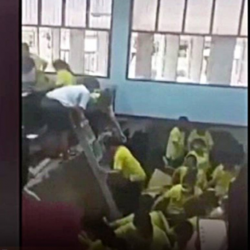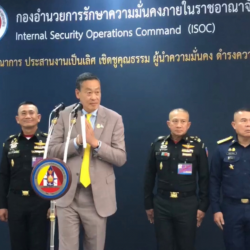Thai welfare state to undergo ‘people power’ revolution with social security election

In a groundbreaking first, millions of Social Security Fund (SSF) members are poised to elect representatives to the powerful board that manages Thailand’s biggest fund and their benefits.
SSF members currently number about 24 million. Of these, about half are eligible to vote in the first-ever Social Security Board (SSB) election. However, they must first register online via sso.go.th by November 10. The inaugural vote by both insured SSF members (mainly employees) and employers is scheduled to take place on December 24.
Bundit Thanachaisettawut, an academic specializing in labor affairs, hailed the board election as a positive step, saying direct representation would increase the transparency of SSF management and respond better to the needs of both employers and employees.
“Policies and recommendations will no longer be discussed behind closed doors or among only a small group of people,” he added.
What is the SSB?
The SSB is a tripartite committee featuring seven representatives for each of three groups – employers, employees (including former employees, the self-employed, freelancers, etc.), and the government. Since its establishment in 1990, SSB members have usually had connections with political office holders.
But the December 24 election will open a new era for the SSB, which currently controls a fund worth 2.4 trillion baht. This massive amount is equivalent to about 7% of the country’s gross domestic product.
The SSB has executive control over the fund and is responsible for authorizing all issuance of benefits to the insured. At present, the SSF offers seven types of benefits: Sickness, Maternity, Invalidity, Death, Child Allowance, Retirement, and Unemployment benefits.
The SSF receives money to fund the benefits from the government, employers and insured persons. The SSB is in charge of regulating SSF’s acceptance of money, payment, and management, with the Finance Ministry’s approval. It also provides opinions on social security measures, policies, and draft regulations to relevant ministers and other authorities.
Response from insured persons?
More than 730,000 people and 2,000 employers had registered for the right to cast their ballots as of November 8, aware that the historic vote may improve not just SSF management but also their own benefits.
The number of those determined to vote remains low, very likely because the upcoming election will be the first and many insured persons will not be aware of it.
“I found out about the election while browsing social media because a politician I follow mentioned it,” said a 25-year-old daily-wage worker at Chachoengsao’s Bang Pakong Industrial Estate. “This news didn’t come to me via my employer or a social security branch,” she added.
Identifying herself simply as Nittaya, the worker said she was eager to cast her ballot because she believed direct representatives of insured persons would make a difference.
“If the SSF offers better medical and child-allowance benefits, it will help my family a lot,” she said.
At present, the SSF grants insured parents or guardians 800 baht per month for each child up until the age of six. It also covers most medical treatments, with some conditions. However, of the three major health schemes in Thailand, the SSF is often criticized for having the least to offer in terms of medical benefits.
Still, Nittaya is doubtful whether she will actually vote on December 24, because it falls during her shift on Sunday, when she makes overtime pay.
“But I may decide to cast my ballot in the end even if I have to skip work, given that I know how important the SSB is,” she said.
Chuenhathai (surname withheld), an office worker, said she did not mind registering in advance for the right to vote but was dismayed to discover there were just 14 voting stations in Bangkok.
“It’s not convenient at all. Many of my friends have decided not to vote because they refuse to drive a long way to exercise their right,” she said.
Bangkok has the highest number of voting stations for SSF members. Samut Prakan comes second, with six stations. Rayong, Chon Buri, and Prachin Buri each have three stations. But other provinces in the country, including Ayutthaya which hosts several large industrial estates, will have just one voting station when the December 24 election is held.
Despite the hassle of traveling, Chuenhathai is determined to vote because she believes elected representatives will do better than those appointed by the government.
“I am now carefully examining the different candidates’ election campaigns,” she said.
Pledges of better social security
Sustarum Thammaboosadee, an academic running for a seat on the Social Security Board under the banner of the Progressive Social Security Group, said his group is focused on promoting transparency in how the fund invests its money and offering more welfare to insured persons. His group has fielded seven candidates including Sustarum.
“If my group is elected, a public hearing will be held before the SSF can invest large amounts in anything involving big investor groups,” he said. “We must make sure that insured persons’ money does not go into grey businesses or unprofitable businesses that might endanger the stability of the fund.”
Also contesting the election is Prof Dr Worawan Chandoevwit, a lecturer at Khon Kaen University and a researcher specializing in social security, labor and health. She insists that the SSF in its current form lacks transparency and does not provide enough information to the public.
“The government is behind in contribution payments. The shortfall is big enough for the SSF to have lost about 2 billion baht a year in lost returns opportunity,” she pointed out. “Also, the SSB sometimes approves the use of funds that are not related to the benefits of insured persons.”
She warned that if the SSF were to run out of money, insured persons would be left with no benefits at all. To avoid this worst-case scenario, insured persons should do their best to select the qualified and capable persons for the SSB, Worawan added.
Other candidates have also vowed to improve SSF management, boost benefits, and better protect the rights of insured persons.
Prominent figures in the electoral race include Prof Dr Worawet Suwanrada, a lecturer at Chulalongkorn University’s Faculty of Economics, and Sawit Kaewwan, president of the Confederation of Industrial Labor of Thailand.
By Thai PBS World’s General Desk






